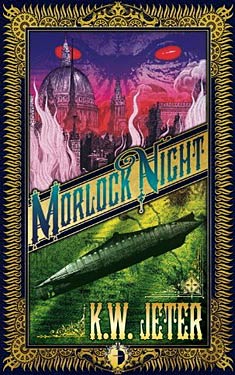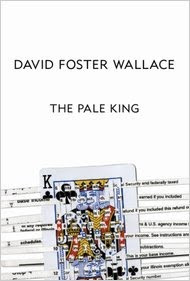I read a lot. And in the next two weeks I will be reading even more, because there has just been an endless amount of great fiction coming out; new books by authors I love and some old stuff coming back into print. Let me tell you about some of it.
Recently I’ve been on a bit of a sci/fi bender, which is rare for me, but with the re-release of K.W. Jeter’s Infernal Devices and Morlock Night, well, when the blurbs on Jeter’s long out-of-print books says ‘Lost Steampunk classic’ they ain’t lying man – in my search to find the origins of a genre that is now, for better or worse, written pretty much to a set of conventions, Jeter is the real deal – in the early 80’s it was he who jokingly coined the term ‘Steampunks’ when trying to describe his and friends’ Tim Powers and James P. Blaylock’s work in the midst of the birth of cyberpunk*. And Jeter is a masterful storyteller, too. Infernal Devices is non-stop clockwork and fish people, mad inventors and Victorian social mores. Morlock Night is next on the list, but being that it is a sequel to H.G. Well’s The Time Machine, I’m re-reading that classic for about the fifth time before seamlessly slipping into Jeter’s follow-up. Basic plot for the sequel: When the Time Traveler (or so it had definitely become convenient to call him) disappears on the Time Machine at the end of Well’s book he returns to the year 800, 2701, only to have the Morlocks steal his Time Machine again and use it to return to Victorian London to wreak havoc.
How is that not awesome??? It takes a special kind of magic for someone other than the original author to have the audacity to write a sequel to a classic and after seeing his chops with Infernal Devices I’m betting Jeter does it perfectly.

In the background of all of this, David Foster Wallace’s unfinished final novel, The Pale King came out about a month ago. I had read reports that Wallace had left an unfinished novel, however it slipped off my radar until my friend Becky brought its availability to my attention. I bought The Pale King shortly after its release but haven’t had a chance to read it just yet – I know my brain and once I read three words written by Wallace I will tumble helplessly out of my sci-fi bender and back into my regular love of the Fiction/Literature section of the bookstores I frequent. And there’s still at least one more big sci-fi release I’m salivating for, and ladies and gentlemen that’s this Tuesday’s release of China Mieville’s new novel Embassytown.

Admittedly I wrote big hype-minded things about last spring’s Mieville novel Kraken and ended up not really liking the book all that much. It started soooo good, but became immersed in so many of Mieville’s trademark weird ideas that the story itself eventually seemed to get bogged down and, for a time, just plain lost. This caused stammers in my reading of it, and after about a month of picking at the middle portion of Kraken I was able to come out the other side to the dénouement and finally finish it. Upon hindsight Kraken sits better than I’d thought during the somewhat arduous reading experience, and I’m not entirely unconvinced that a second reading of the novel would dispel many of my issues, although with such a bittersweet relationship with Kraken the first time I’m in no real hurry to put that theory to a test. However, 2009’s City and the City** was an intense two-day reading experience that rocked my world and still stands as one of my favorite, and in my opinion best, novels of my lifetime (at least). Warren Ellis once described City and the City as taut and honestly, I don’t know a better way to sum it up, one word or more. So what will Embassytown be like?
Probably pretty awesome, because even if Kraken was a little bit of a disappointment, China Mieville at his worst is still light years better than about eighty percent of the other sci-fi/fantasy out there. This is the author of the incredible Bas Lag books – of which Perdido Street Station stands as the high water mark for fantasy for ALL TIME in my book (although granted I’m slightly under-read in that area). And as if a sign, although whether a good one or not I’m still not quite certain, I was shocked to the core to open an entertainment weekly recently and find a full-page review of Embassytown, and although I’m curious as all hell as to a description of the book, I’ve read nothing, as it is always better to go in blindfolded than even semi-aware of a plot, especially in Mieville’s case when the stories tend to open-up in sometimes maddening obscurity and then burst open into glorious and usually fairly alien concepts along the way.

Also in May, at the very end of the month, Spanish master wordsmith Carlos Ruiz Zafon, author of the mouth-wateringly magnificent The Shadow of the Wind and The Angel’s Game has a new one hitting the stands. The Midnight Palace is not what I expected at first; that is, another entry into the apparently four-book cycle that includes the aforementioned titles and at least loosely revolves around the book-selling Sempere family of late nineteenth century/early twentieth century Barcelona and their relationship with The Cemetery of Forgotten Books. Instead, Palace is apparently another entry in the translating of Ruiz Zafon’s young adult titles (The Prince of Mist was the first – I haven’t read it yet but am planning a double-header once Palace is out) previously published in the 90’s in his native Spain. Here’s another instance where I do not want to know too much going in – it is enough to know I LOVE the author’s way with words and that the first book (not sure if they’re related) The Prince of Mist is, if memory serves, mentioned in The Shadow of the Wind as one of the mysterious writer Julian Carax’s novels.

With all of these books coming up in the very immediate future I am re-affirmed in my belief that I really need to find a way to get paid for reading.
………………….
* Which I’m cutting and pasting below because it just makes me smile to read this correspondence.
“Dear Locus,Enclosed is a copy of my 1979 novel Morlock Night; I’d appreciate your being so good as to route it Faren Miller, as it’s a prime piece of evidence in the great debate as to who in “the Powers/Blaylock/Jeter fantasy triumvirate” was writing in the “gonzo-historical manner” first. Though of course, I did find her review in the March Locus to be quite flattering.
Personally, I think Victorian fantasies are going to be the next big thing, as long as we can come up with a fitting collective term for Powers, Blaylock and myself. Something based on the appropriate technology of the era; like “steampunks”, perhaps…
—K.W. Jeter”
** Which I blogged about here City and the City